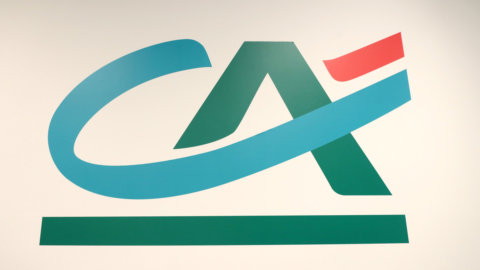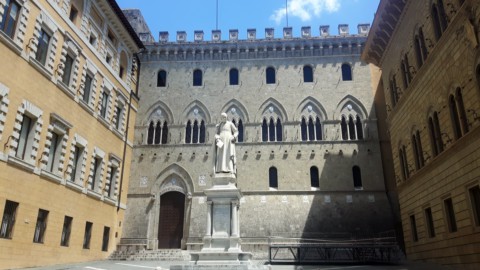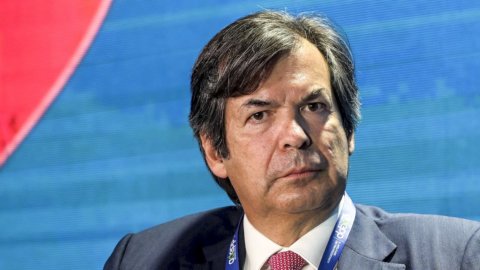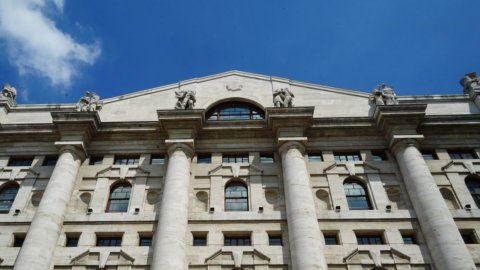The disappointment that pushed the price lists into the red comes from the Financial Times (and not from the EU summit): the tests on rendemsivir, Gilead's anti-virus drug already enthusiastically welcomed by the markets, did not give positive results; indeed, out of the 237 human "guinea pigs" involved in the test, as many as 79 showed serious collateral damage.
The vaccine therefore has to wait and the markets can only trust the interventions of the authorities. But the week ends on a note of disappointment. Wall Street futures are down about 0,5%. Yesterday the S&P500 index closed on parity, after an upward start to the session. The new shower of requests for subsidies (4,4 million for a total of 26 million in April) was offset by the flood of money arriving from Washington: the House also approved the small business aid package approved by the Senate on Tuesday . In addition to the 320 million for companies with fewer than 500 employees, there are, as requested by the Democrats, 75 billion dollars for hospitals and 25 billion for mass diagnostics.
Sharp decline Intel, -5% after the accounts. Only Las Vegas Sands shines (+12%), which foresees a rapid recovery of casinos in Macau.
Asia doesn't share the casinos' optimism. The Dow Jones Asia Pacific is down 0,3%, the Tokyo Nikkei 0,8%. The Shanghai Composite lost 0,3% in the middle of a session marked by the new intervention of the central bank of China.
Ahead of a critical 267 billion yuan bond maturity, the People's Bank made available a 56 billion yuan ($8 billion) credit facility at a rate of 2,95%, twenty basis points in less than the previous operation.
The Bank of Japan has announced that the cap on purchases of securities and ETFs on the market will drop next week. Tokyo will adopt an unlimited bazooka to deal with the effects of the epidemic crisis.
The dollar remains strong against almost all currencies on the planet. The Brazilian real is especially suffering these days, after the Central Bank spoke of the possibility of a new rate cut. The dollar-real cross is at an all-time high. Even the rand of South Africa, among the worst currencies in the world since the beginning of the year, is currently suffering from the strength of the dollar.
Brent oil, on the other hand, is up 4%, to 22,3 dollars, from 4% at last night's close.
After the EU summit, the euro fell this morning for the fifth consecutive day, close to the lows of the last month. Futures on European stock exchanges anticipate a downward start.
IN JUNE THE MONEY FROM THE ESM AND THE EIB, THEN THE RECOVERY FUND
“The risk is of doing too late and too little to protect the economy from the effects of the pandemic”. The summit of EU Heads of State and Government opened yesterday afternoon with this warning from Christine Lagarde. But already in the morning, speaking to the Bundestag, Angela Merkel had anticipated the line she then followed: yes to the enlargement of the community budget and to the interventions already decided on the EIB funds, on the Sure program for employment and on the "light" Mes. Distances remain but there is enough space to avoid a dangerous impasse. The EU Commission will be working in these days to present the outline of a "Recovery Fund” of adequate size (Ursula von der Leyen spoke of at least one trillion euros). The president clarified that to finance the Fund, the Commission will borrow money on the financial markets, increasing the share of own resources in the Community budget up to 2%, but Northern and Southern countries remain divided on the total amount of the Fund.
ANGELA MERKEL: CONSISTENCY IS NEEDED ON EXPENDITURE CRITERIA
There are those, like Giuseppe Conte, who appreciated the glass half full because the need for "urgent and rapid" action was recognized. In France and Spain (cf Le Monde ed El Pais) disappointment prevails, because the distances on the modalities and the spirit of the intervention remain wide. Peremptory Angela Merkel: "If we are going, as we seem to be going, towards the mobilization of an unprecedented amount of money to build the necessary budgetary capacity - she said - then we need to have consistency in corporate tax systems and we need a path of convergence: not a huge amount of different ideas about how to use our tax systems.
MILAN ADVANCES (+1,5%), TODAY THE FITCH RATING
Milan (+1,47%) was the most toned stock market yesterday. The index is back above 17 thousand points.
The note from the ECB announcing "measures to mitigate the effects of possible downgrades on the availability of collateral" favored the recovery above all: until 21 September bonds that fell below the Investment Grade threshold will also be accepted as pledge, subject to adjustment of their value (haircut). The decision defuses the risk that, in the event of a rating cut, the BTPs will no longer be purchasable by the central bank because they have slipped to the level of junk bonds. Rating agency Moody's will leave Italy's credit rating unchanged given the "temporary" nature of the crisis. Standard & Poor's judgment is expected today.
DEF UNDERWAY: EXPECTED GDP -8%, DEBT AT 155,7%
The Council of Ministers called to approve the Economic and Financial Document will meet this morning at 10. According to the first drafts, the Def will forecast a GDP contraction of 8% in 2020 (to recover by 4,7% in 2021), a deficit/GDP ratio of 10,4% and a public debt rising up to 155,7%. 55% of GDP. The government is preparing to ask Parliament for a new budget gap of 10 billion. Resources that will be used to fuel the anti-crisis measures: 12 billion in support of businesses and another 13 for creditor ones; 2021 to refinance the social safety nets, including layoffs. The Council of Ministers should also formalize the cancellation of the VAT safeguard clauses from XNUMX
RECORD PROVISIONS (+700%) FOR CREDIT SUISSE
The other markets were positive: Frankfurt +0,95%, Paris +0,89%, Madrid +0,40% and London +0,97%.
Only Zurich is lagging behind (-0,05%), held back by the race for the franc. The Swiss banking authority is doing everything possible to avoid the revaluation of the currency, at the highest level in five years. In the first quarter, sales on the Swiss currency resulted in losses of the equivalent of $39 billion for the central bank, the highest loss since 1907, the institution's birth date.
THE PMI INDEX AT THE LOWEST EVER
Justifying the pessimism, if any were needed, was also the expected plunge in the PMI leading indices: the composite purchasing managers' index elaborated by IHS Markit fell to 13,5, by far its lowest reading since the survey began in mid-1998, significantly below all forecasts. “April saw unprecedented damage to the eurozone economy from virus lockdown measures coupled with falling global demand and staff and input shortages,” said chief economist Chris Williamson: “The ferocity of the crisis has even exceeded that deemed imaginable by most economists”.
THE BTP RETURNS BELOW 2%, SPREAD TO 243
Day of recovery for the bonds of the European periphery. The 1,97-year BTP, while slowing down in the last few stages, moved to a yield of 8% (-2,04 basis points) from the initial 243%. The spread closes the session at XNUMX points.
End of month auctions kick off today. The Treasury offers Ctz and Btpei for 3,75 billion euros. Against 0,307% at the auction at the end of March, the rate of the November 2021 zero coupon certificate was indicated at the end of the session at around 1,03% on the secondary market, at the highest rate since October 2018.
BANKS ARE BREATHE: -40% SINCE JANUARY
The banks, boosted by the intervention of the ECB, contribute to supporting Piazza Affari: the European sector, the Eurostoxx Bank, is by far the best of the day with an increase of over 5%. But the sector accuses a decline of 40% compared to January. Mediobanca takes off (+6,37%). Unicredit (+2,71%) and Intesa Sanpaolo (+3,45%) were very positive. Bper (+3,36%) and Bpm (+2,65%) also performed well.
AIR OF AGREEMENT FOR ATLANTIA +8%
The brightest stock for the second day in a row was Atlantia (+8,04%). The market is betting on an agreement with the government, perhaps by June: the issue of revoking the concession would no longer be taken into consideration, in favor of changing control of Aspi (Autostrade per l'Italia).
Astm is also advancing (+7,02%), leader of the Gavio group.
TIM MAKES CASH WITH INWIT AND RETURNS TO THE DIVIDEND
Inwit was in deep red (-7,92%, at 9,8 euros), after Tim and Vodafone announced that they had completed the joint placement of an 8,6% share on the market at 9,6 euros per share.
The gross proceeds for Tim from the placement are approximately 400 million, to which must be added the 214 million collected for the extraordinary dividend and approximately 73 million relating to the deconsolidation of Inwit's debt.
The Tim assembly (+3,37%) yesterday approved the 2019 financial statements, which closed with a net profit of 382 million euros. The shareholders resolved to allocate a dividend of €0,01 for ordinary shares and €0,0275 for savings shares.
OIL RETURNS
Oil companies are recovering: Eni +1,49%: Kepler Cheuvreux has raised the target price from 10 to 10,5 euros, confirming the buy recommendation on the stock. Tenaris rebounds (+3,97%). Also worth mentioning is Saipem (+1,53%), in the wake of the positive judgments of analysts after the accounts for the first quarter of 2020. The stock is to be bought both for Banca Imi (Target at 3,4 euros) and for Banca Akros ( 4,5 euros).
THE LAMBS IN GEDI ERA HAS STARTED. MOLINARI TO THE REPUBLIC
The new Gedi (+0,22%) with the Agnelli-Elkann license plate takes shape. Yesterday the transfer to Exor (+0,19%) of 43,78% of the group was completed, sold by Cir (-0,62%) for 102,4 million. Exor will acquire 5,06% of Mercurio owned by the Perrone family and 6,07% of Giacaranda Falck before launching the mandatory takeover bid on the remaining shares. A few hours after the board of directors which appointed John Elkann as president, the turnaround came: Maurizio Molinari will become the director of the Republic instead of Carlo Verdelli. To take the helm of Print and local newspapers will instead be Massimo Giannini, while Mattia Feltri will become director of the Huffington Post.
Among industrialists, Cnh Industrial (+5,87%) leaps ahead of Stm (+4,73%) and Leonardo (+4,7%). Fiat Chrysler +3,52%.
Diasorin (-3,58%), Amplifon (-2,21%) and Moncler (-1,02%) retrace downwards. Weak closure also for utilities: Snam -1,43%, Italgas -2,48%, A2A and Enel -1%.





